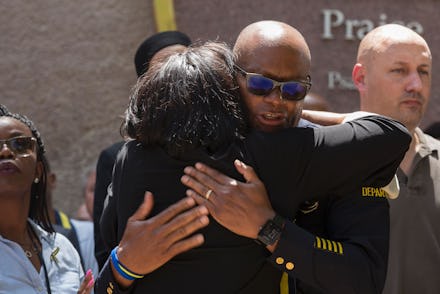The Dallas Protest Shooting Is An Opportunity for Difficult, Honest Public Dialogue

This week, two black men were killed by white law enforcement officers. On Tuesday, Alton Sterling was fatally shot by Baton Rouge police officers responding to a 911 report that he had a gun. And on Wednesday, before the nation had yet to recover from the shock of Sterling's gruesome death, Philando Castile was shot by a police officer after being stopped for a traffic violation in a St. Paul, Minnesota.
The shootings of two black men by white police officers resulted in peaceful protests across the U.S. Dallas was the site of one demonstration on Thursday evening. But as protesters began to march, a lone gunman fired at law enforcement officers present. Five law enforcement officers are now dead and several officers and civilians were wounded.
The deaths of the law enforcement officers are reason to grieve. The shooting is a moment to reflect on a culture of violence that ends lives, destroys families, disrupts communities and leaves so many across the country gasping for relief and safety.
At its core, the movement for black lives is a response to a similar problem. The movement has centered on the sanctity and value of black life. In response to the Dallas police shooting, the Black Lives Matter Network released a statement asserting it "advocates for dignity, justice, and respect."
The movement has been catalyzed by a call to end all forms of systemic violence. It is a call for transformation not regression, which is why it is irresponsible to link the actions of the lone gunman accused of shooting law enforcement and civilians at the Dallas protest to the movement. And it is just as harmful to dismiss the reason the demonstrations were organized in the first place.
But too often, media coverage fails to offer the type of nuanced coverage that tragedies of this nature deserve. One news headline announced that Thursday was the "deadliest day for law enforcement since 911." After yesterday's shooting, the number of law enforcement officers who have been killed by gunfire in 2016 increased to 21 according to the Officer Down Memorial Page, described as a "nonprofit organization dedicated to honoring America's fallen for law enforcement heroes" on its website. However, the shooting in Dallas should not distract from the 566 plus people who have been killed by police during the same time as reported by the Guardian's "the Counted" project. 136 of that number were black people.
Yet, former Texas congressman Joe Walsh wrote in a tweet that has since been deleted shortly after the shooting, "This is now war. Watch out Obama. Watch out black lives matter punks. Real America is coming after you." Walsh's inflammatory comments may seem to represent the extreme, but at its core, it is a type of common sense urgency regarding the need to protect some lives and not all.
Protestors took to the streets because police abuse that sometimes ends in the death of black people is not anomalous. According to an anaylsis of FBI Data obtained and assessed by Vox's Dana Lind, black people are more likely to be killed by police than white people. Too often, the merciless killings of police and civilians seem to be weighted differently.
Black Lives Matter exists because black Americans know that mattering of black lives is still so contested that it is possible that a black person can be shot dead by police and still considered culpable in their own demise.
Now is the time for difficult, honest public dialogue. Now is the time for us to sit in the grey. If we assess the Dallas snipers' bullets as somehow more deadly than those used by the police officers who killed Sterling and Castile, then we are only revealing our nation's inability to be honest about ongoing patterns of systemic violence.
Grief and empathy should be meted out equally and our lives should not be afforded different values.